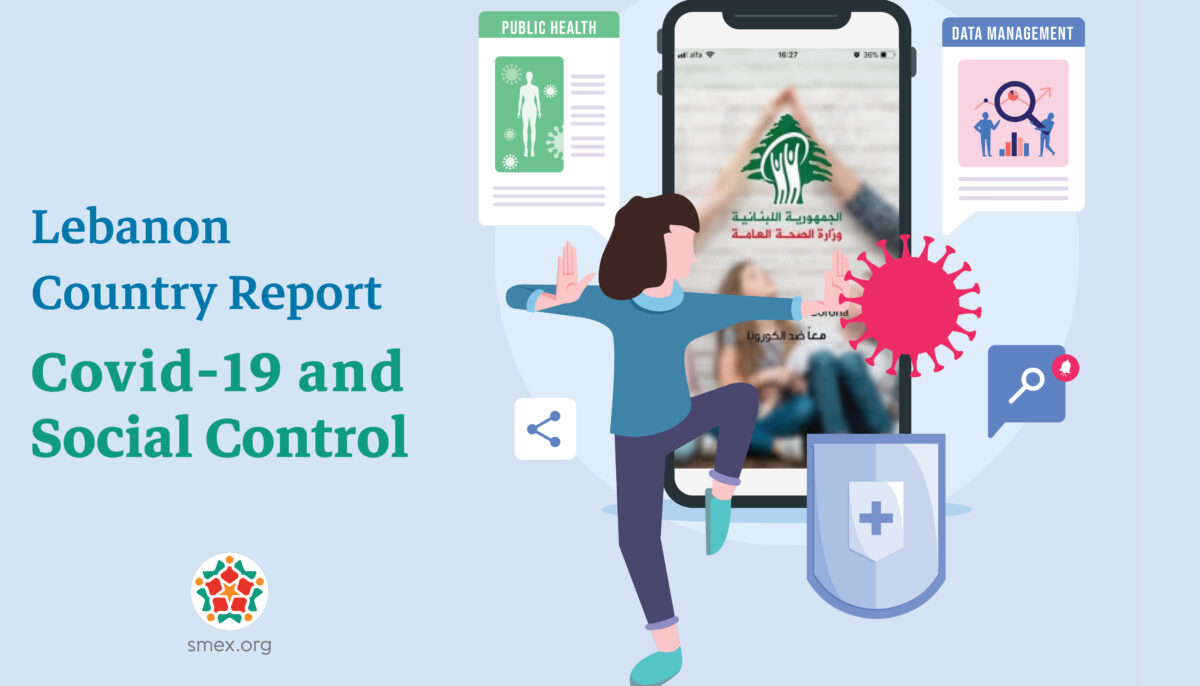The Lebanese government’s response to Covid-19 was deeply affected by the failing economy and political unrest, both of which the government helped create. The government’s haphazard lockdown strategy, which shifted based on the political mood, was ultimately ineffective as the government did not develop a long-term strategy to deal with the pandemic. In some cases, the early lockdown did enable the government to suppress protests, but recently, frustration with the lockdown and the lack of financial support from the government have pushed people across the country back on to the streets. Moreover, while lockdown contributed to economic stagnation, it was particularly harmful to refugees, who occasionally faced more restrictions on their freedom of movement.
On September 1, 2020, Lebanon introduced “Ma3an – Together Against Corona,” a contact-tracing application intended to slow the spread of Covid-19. The disease had expanded at an accelerated rate since the country reopened the airport and ended the four-stage lockdown at the beginning of July 2020.
This report aims to assess the government’s pandemic response, and the ways it has affected social control and social exclusion, with a particular focus on Ma3an and other electronic platforms launched by the government. We examine the impact of the app and other platforms within the broader context of Lebanon’s response to Covid-19, especially the government’s decision to lock down the country, both partially and fully, over the course of the pandemic. In our analysis of governmental procedures and online platforms in response to the pandemic, we observed how these measures have affected Syrian refugees in particular.
Ultimately, the report finds that the response to the pandemic failed because of an overall lack of strategy, which was exacerbated by the economic crisis, the port explosion, poor handling of data, and inadequate and poorly implemented aid to citizens. The launch of Ma3an did not demonstrably affect the public health response, as there were flaws in the rollout, bugs in the app, and a limited user base.
At times, the Lebanese government used the lockdowns as a means to crack down on anti-government protests, but the most recent lockdown actually provoked protests. Demonstrations were held against the government’s inability to effectively support citizens as the economy worsened, while upholding the opposition to widespread corruption that began in October 2019. Moreover, the state of emergency declared in response to the Beirut blast in August 2020 also posed significant threats to people’s rights and freedoms.
Neither Ma3an nor any of the electronic platforms launched by the government present serious threats in terms of further social control, though they do all imply privacy threats. Ma3an, unlike other contact tracing apps in the Middle East-North Africa region, was never mandatory for any population group, but the more recent platforms, particularly ones where citizens have to submit movement requests during the lockdown, could increase social control.
The lockdown measures were also applied unevenly to Syrian refugees and the impact was worse because of the economic crisis. Ma3an was never widely adopted by refugees and because the app was not mandatory, it did little to restrict their movement. The more recent platforms that require permission to move during the 24-hour curfew and register for a vaccine, however, present a greater threat of exclusion.
Finally, it is impossible to assess the government’s response to the pandemic in a vacuum, as the protests, which began in October 2019, and the economic collapse, which began before the pandemic, often played a larger role in influencing government decisions.
Conclusion and Recommendations
In the wake of the Beirut blast, the government launched the contact-tracing app Ma3an which was not widely used and did not help limit the spread of the disease. While the app has privacy concerns, it is unlikely that it will become a surveillance tool as the government has turned to new electronic platforms to allow people to move during lockdown and organize the administration of vaccines. These new tools, developed by IMPACT, collect more personally identifiable information and fail to take a “privacy by design” approach. While IMPACT, a collaboration between the private sector and the government, has implemented privacy and security measures after vulnerabilities have drawn attention on social media, the rushed rollout raises concerns.
We would like to make the following recommendations.
Regarding the Public Health Response:
- Develop a clear national strategy to better prevent and mitigate Covid-19
- Improve data-sharing practices between different government entities while respecting the right to privacy
- Provide more aid to people in need in a more efficient manner and limit the role of the army
- Strengthen cooperation and coordination between the public and private sector concerning the preparedness of hospitals
- Improve support for healthcare workers
- Reduce the cost of Covid-19 tests
- Bolster the capacity of the Epidemiological Surveillance Unit
- Improve communication with the media
Regarding Applications and Technology to Fight the Pandemic:
- Approach application development using a privacy by design framework
- Remove requests for location data from any contact tracing apps
- Publish more detailed policies in Arabic and English and explicitly name any third parties that have access to data
- Consult academics and civil society while developing these apps
Regarding the Potential for Social Exclusion:
- Develop alternative, non-digital means for movement requests and vaccination registration
- Enforce the lockdowns evenly across Lebanon
Download full report here.
SMEX-Lebanon-COVID-APPS-Report-1


